
Fathimath Raufa Moosa is Monitoring and Evaluation Officer at the Ministry of Environment and Energy of the Maldives and responsible for reporting greenhouse gas emission to the UNFCCC in the context of the Enhanced Transparency Framework. She just started working on a project on updating the emission inventory in her country and transport is one of the areas that was identified as important to improve. She was one of 26 participants from 10 countries that just participated at a 3-day training course called “MRV for Transport in Asia”.
The 21st Climate Conference in Paris in 2015 agreed to unify the reporting standards between all countries with the Enhanced Transparency Framework. It asks developing countries to report emissions and climate actions at more detail in so-called Biennial Transparency Reports. But it is challenging for countries to translate these new requirements into national settings for data collection, NDC implementation and baseline scenario development. Transport is one of the sectors that is very relevant, as it causes a high share of emissions – usually between 10 and 30 percent – but is difficult to quantify because of the millions of sources such as cars, motorbikes, trains and planes.
The UNFCCC and GIZ-organised regional training course in Ha Long, Vietnam discussed the core aspects of the Enhanced Transparency Framework from the country’s perspective. The participants explored the three learning objectives interactively and with a lot of exchange between the participants.
This is a crucial opportunity for Viet Nam and our fellow countries in the Asia-Pacific region to learn and exchange on the technicalities of a consistent MRV system for the transport sector.
Tran Anh Duong, Deputy Director General at the Department of Science, Technology and Environment of the Viet Nam Ministry of Transport

Many countries designed their transport GHG inventory with the principles of transparency, consistency, comparability, completeness and accuracy (TCCCA) as guiding principles in preparing and reporting inventories in mind. However, many participants face challenges in terms of data acquisition and management and consistency and technical implementation. The fragmentation of the transport sector often results in extensive data collection. Dilini Liyanage (Sri Lanka) asked: “I want to know when the data is unavailable, or when the data has some gaps what I can do, and what the best approach is” The participants discussed with each other to understand the main challenges in accessing and collecting transport data and identify tools and models to overcome them. For Dilini this was helpful and she confirmed: “From this training, I learned to identify some methodologies and approaches.”
Not only for the island states that participated in the training, the impact of climate change is already a challenge and reducing GHG emissions efficiently and quickly became the critical question of our time. The training took one and a half days to look at prioritising climate change actions to reduce GHG emissions in transport effectively: It familiarised everyone with scenarios and baseline setting, GHG projection and assessment methodologies, starting from a broad vision and becoming very concrete when looking at specific tools that could be used.

I liked the fact that we got to move around. We didn’t just listen and learn something, but we calculated on our own and analysed information. I really liked the diversity!
Fathimath Raufa Moosa, Maldives
The training in Ha Long was the third regional training by GIZ and UNFCCC, after a first one in Nairobi for African countries in February 2020 and a second one for Latin American countries (online) in June 2021. The training was hosted by the Ministry of Transport in Vietnam and supported by UNFCCC and the NDC Transport Initiative for Asia.
As measuring and reporting emissions is the basis for identifying impactful climate actions, GIZ has been focusing on capacity development in its global programmes funded by the International Climate Initiative of the German Government. In the past years, not only training courses, but a variety of publications have been developed specifically targeting decision-makers and researchers in developing countries.
The transparency toolkit summarises these approaches in a coherent manner, key publications are:
Furthermore, the toolkit includes a variety of tools such as the TRIGGER for bottom-up emission inventories or the MobiliseYourCity Emission Calculator for quantifying impacts of Sustainable Urban Mobility Plans (SUMPs).
To reach even more practitioners, GIZ will launch an online training course in August 2023. The key to success lies not only in the content, but also in the didactics and close involvement of the trainees, in order to know their needs and to involve them actively in the sessions.
If you are in need to better quantify transport emissions and want to know more about the course or even want to organise a training in your country, please get in touch with GIZ’s transport MRV expert in Asia, Michel Arnd, michel.arnd@giz.de
NDC Transport Initiative for Asia (NDC-TIA) is part of the International Climate Initiative (IKI). The German Federal Ministry for Economic Affairs and Climate Action (BMWK) supports this initiative on the basis of a decision adopted by the German Bundestag. It supports China, India, and Viet Nam as well as regional and global decarbonisation strategies to increase the ambition around low-carbon transport.
In Viet Nam, the project’s implementing organisation is the Deutsche Gesellschaft für Internationale Zusammenarbeit (GIZ) GmbH and partner institutions include World Resources Institute (WRI) and International Council on Clean Transportation (ICCT). Viet Nam Ministry of Transport (MOT) is the Lead executive organisation and the Department of Science, Technology and Environment (DOSTE) is the project owner. For more information on the project, please visit: https://www.ndctransportinitiativeforasia.org/.
 Fatima Raufa Moosa from Maldives, one out of 26 participants form 10 Asian countries ©Daniel Bongardt, GIZ
Fatima Raufa Moosa from Maldives, one out of 26 participants form 10 Asian countries ©Daniel Bongardt, GIZ
Michel Arnd
michel.arnd@giz.deVisit profile
Hang Nguyen Thanh
hang.nguyenthanh@giz.de
You are currently viewing a placeholder content from X. To access the actual content, click the button below. Please note that doing so will share data with third-party providers.
More Information